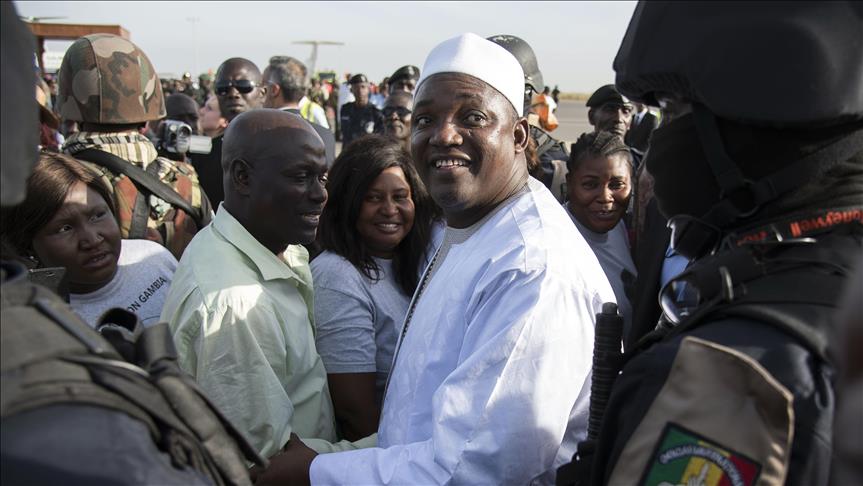 Gambia's president Adama Barrow
Gambia's president Adama Barrow
By Mustapha K. Darboe
BANJUL, Gambia
Gambians are celebrating 53 years of independence from Britain on Sunday, Feb. 18, the same day they are remembering President Adama Barrow’s taking the oath of office on home soil since his landmark election victory of Dec. 1, 2016, ushering in the end of decades of autocratic rule.
But one year on, the coalition that made it possible to topple former autocratic ruler Yahya Jammeh has started disintegrating.
Barrow, who was exiled to neighboring Senegal after his election -- which his predecessor refused to recognize -- for his own safety, initially took his oath of office at the country’s embassy in Dakar.
Ismaila Ceesay, a Gambian political analyst, said Barrow is no longer working on the transition from the decades-long autocratic order.
“The transition has been aborted in the sense that Barrow and his government are
“Barrow’s mission is to give us democracy but he is lacking focus because he is trying to reform institutions, bring new laws, and at the same time develop the country. This is impossible to do.”
Barrow came to power with the backing of seven political parties as an independent candidate on a transitional agreement plan that he should only serve three years, change the country’s bad laws, level the political playing field, and then step down.
But that agreement is now in doubt.
And though the new leader delivered democracy and freedom, reforms of both institutions and laws remain unfulfilled and the coalition has started disintegrating.
Barrow fired one of his key coalition partners, Mai Fatty, last November.
Shortly
Meanwhile, both the coalition stakeholders and the Gambian people are divided as to whether Barrow should serve three years or the constitutionally mandated five.
Kemo Bojang, a youth activist, agrees that reforms were “too slow” but argued that the odds were against Barrow’s administration since he “inherited a broken system.”
Since coming to power, one of Barrow’s notable achievements was cutting public expenditures towards keeping the country’s debt at a minimal low.
Sidi Sanneh, a U.S.-based economist and analyst of Gambian affairs, said despite the “expected” disagreements within his coalition, Barrow has “delivered on promises of opening the democratic space.”
“Barrow has been slow on legal and institutional reforms. Personally, I think that the priorities are misplaced,” he added.
“It appears that they value or place a higher premium on development projects than institutional and legal reforms, which are necessary prerequisites for attracting foreign investments.”
However, Hassoum Ceesay, the country’s leading historian and curator at the National Museum in Banjul, said despite the disagreements between the political players, Barrow’s swearing-in, ending over two decades of Jammeh’s rule, marks the most historic moment since independence.
“The new government symbolizes what was fought for by our founding fathers at independence, which was the rule of law, freedom, and independence,” Hassoum told Anadolu Agency.
Independence
Barrow will make the Independence Day address to Gambians in the capital Banjul on Sunday for the first time since his inauguration.
When it won independence in 1965, Gambia was a struggling country with life expectancy at 30 years, two hospitals, no road network, one high school, and no infrastructure for basic governance.
Though still very much aid dependent, with 48 percent of the country living at poverty level, Hassoum said the country’s “success from independence to now is phenomenal because you have to measure it with what was here.”
However, Ceesay believes the country could have done better.
“Apart from building a weak state, we have not built a democratic state that can respond to the needs of our own people for 53 years, and that is really unfortunate,” Ceesay said.
“I don’t think the colonial legacy is an
But Sanneh, who was a civil servant under the country’s first leader, Dawda Kairaba Jawara, said the 1994 coup which brought Jammeh to power was what retarded the country’s growth.
Anadolu Agency website contains only a portion of the news stories offered to subscribers in the AA News Broadcasting System (HAS), and in summarized form. Please contact us for subscription options.

